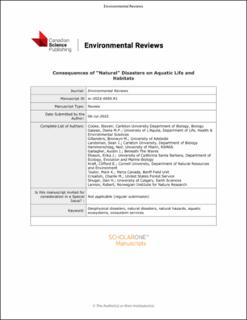Consequences of “natural” disasters on aquatic life and habitats
Cooke, Steven J.; Galassi, Diana M. P.; Gillanders, Bronwyn M.; Landsman, Sean J.; Hammerschlag, Neil; Gallagher, Austin J.; Eliason, Erika J.; Kraft, Clifford E.; Taylor, Mark K.; Crisafulli, Charlie M.; Shugar, Dan H.; Lennox, Robert
Peer reviewed, Journal article
Accepted version

Åpne
Permanent lenke
https://hdl.handle.net/11250/3092355Utgivelsesdato
2023Metadata
Vis full innførselSamlinger
- Publikasjoner fra CRIStin - NINA [2364]
- Scientific publications [1392]
Sammendrag
“Natural” disasters (also known as geophysical disasters) involve physical processes that have a direct or indirect impact on humans. These events occur rapidly and may have severe consequences for resident flora and fauna as their habitat undergoes dramatic and sudden change. Although most studies have focused on the impact of natural disasters on humans and terrestrial systems, geophysical disasters can also impact aquatic ecosystems. Here, we provide a synthesis on the effects of the most common and destructive geophysical disasters on aquatic systems (life and habitat). Our approach spanned realms (i.e., freshwater, estuarine, and marine) and taxa (i.e., plants, vertebrates, invertebrates, and microbes) and included floods, droughts, wildfires, hurricanes/cyclones/typhoons, tornadoes, dust storms, ice storms, avalanches (snow), landslides, volcanic eruptions, earthquakes (including limnic eruptions), tsunamis, and cosmic events. Many geophysical disasters have dramatic effects on aquatic systems. The evidence base is somewhat limited for some natural disasters because transient events (e.g., tornadoes and floods) are difficult to study. Most natural disaster studies focus on geology/geomorphology and hazard assessment for humans and infrastructure. However, the destruction of aquatic systems can impact humans indirectly through loss of food security, cultural services, or livelihoods. Many geophysical disasters interact in complex ways (e.g., wildfires often lead to landslides and flooding) and can be magnified or otherwise mediated by human activities. Our synthesis reveals that geophysical events influence aquatic ecosystems, often in negative ways, yet systems can be resilient provided that effects are not compounded by anthropogenic stressors. It is difficult to predict or prevent geophysical disasters but understanding how aquatic ecosystems are influenced by geophysical events is important given the inherent connection between peoples and aquatic ecosystems.